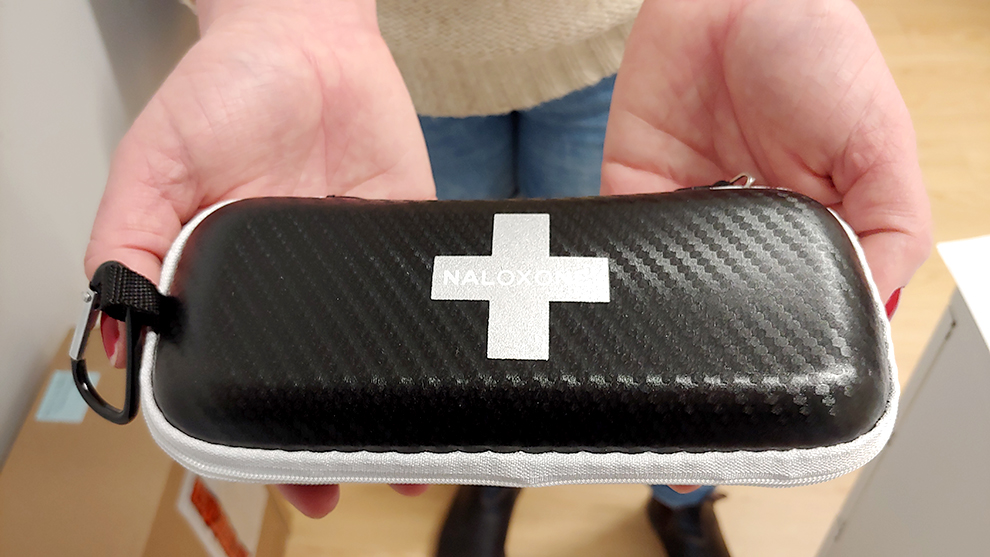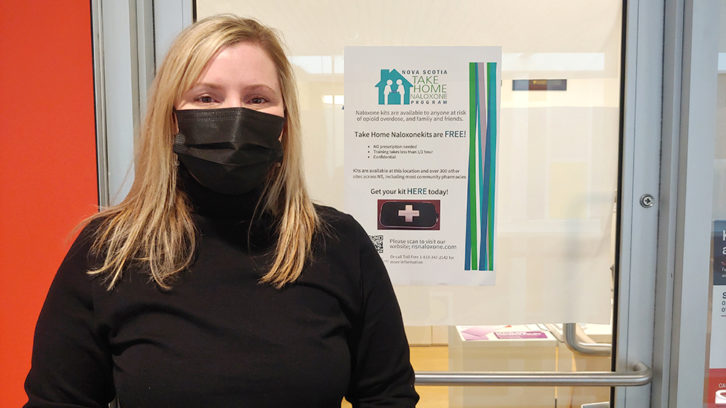Dalhousie provides opioid overdose prevention training for students
Nova Scotia's only on-campus naloxone training site was created from student feedback

caption
One of the naloxone kits that are offered at Dalhousie's student health services centre.Students at Dalhousie University learned how to use potentially life-saving overdose prevention kits at a virtual event Tuesday evening.
The kits contain a special medicine called naloxone, and are for use in case of a suspected opioid overdose.
Naloxone acts by blocking opioid receptors in the brain, stopping the drug momentarily. If given correctly, naloxone can potentially reverse the effects of an overdose, and buy precious time for medical personnel to provide life-saving care.
Around 40 people signed up for the event on Tuesday night, hosted by Dal’s student health promotion manager Jonnie-Lyn Baron.

caption
Jonnie-Lyn Baron is the student health promotion manager for Dalhousie’s student health services centre.She delivered instructions on how to use the kit, when and where to give the medicine, and a reminder that judgment has no place in community care.
A naloxone kit contains two vials, each containing 1 ml of medicine. Baron taught students how to draw the substance from the vial into a needle, also provided in the kit. She then taught them how to inject the person suspected of overdosing in their upper arm or thigh.
In Baron’s eyes, naloxone training is important for two reasons: preventing overdoses, and combating the stigma surrounding drug use.
“Many of us have been taught to view people with substance use disorders, or mental health disorders that are associated with them, as criminals,” she said, stating that the public needs to “know better” and “do better” when handling substance abuse.
Nicole Pickett is a student at Dal and a receptionist at the university’s student health services centre. While she hasn’t yet attended a training session, she plans to.
“I think it’s similar to having a first aid certificate, it’s a good thing to have so you’re always prepared, always ready in case the situation arises,” Pickett said.
These events help inform the public against stigmatizing drug users, and provide information about how to find treatment for substance abuse disorders, said Baron.
According to Baron, Dalhousie is the only university in Nova Scotia that acts as a naloxone pickup and training site.
Starting in 2019, the naloxone program is part of Dal’s many training sessions focused on providing harm reduction and addressing mental health issues. The training has become increasingly relevant; young Canadians aged 15 to 24 are the fastest growing population requiring hospital care from opioid overdoses, Baron said.
The events began due to requests from students.
“Some resident advisers reached out through Dal, and the take-home naloxone program approached me and asked if we’d like to be a site,” Baron said.
“I just saw the need, anecdotally, and students wanted it (as) a part of that student training piece.”
Originally for student leads and advisers, it eventually branched into being available for all students.
For Pickett, the motivation for naloxone training stems from her friends and community.
“I personally don’t use any recreational drugs, but I have friends who occasionally dabble. I also live in an area where a lot of people nearby have substance abuse disorders,” she said.
“If I ever needed to help someone with an overdose, it’d be nice to be able to.”
The need for naloxone training transcends demographic barriers. Baron believes that everyone should carry a kit, and take a training course. She also thinks the training is for anyone who wants to be a good community member.
Outside of Dal, free naloxone kits can be found at various pharmacies in Nova Scotia. Training is required to get a kit.
Pharmacist Peter Jorna at Nova Pharmacy and Convenience on Coburg Road thinks that educating students at universities is a great idea. His pharmacy also conducts naloxone kit training.
“Yeah, absolutely, because they’re young and they have their whole life ahead of them. If you educate people younger, the more knowledge about this there is going forward,” Jorna said.
Tuesday evening was Dalhousie’s last event for the year, but student health services is planning more events for 2022.

